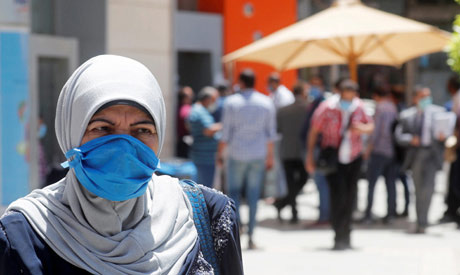
File photo: A woman wearing a protective mask looks on as people wait to make withdrawals outside a branch of Commercial International Bank (CIB), amid concerns over the coronavirus disease (COVID-19) in Cairo, Egypt REUTERS
The Egyptian Center for Public Opinion Research 'Baseera' stated that according to its latest survey 2.9 million Egyptians could have been infected by coronavirus in 2020.
According to the results in its latest survey, which was released on Wednesday, 867,000 Egyptians from age 18-years-old and above suffered from COVID-19 in November and December 2020.
Baseera stated that the results of the survey were based on telephone interviews to find out the rates of coronavirus infections among Egyptians within the age group of 18 and above.
The interviews were conducted from 27 December 2020 till 10 January 2021 in sample groups consisting of 3020 citizens from all governorates.
Baseera noted that that the results and the estimations of the survey depended on the answers of the surveyed.
It also noted that some of the answers do not depend on “clinical diagnosis” but rather “personal diagnosis”.
The survey also covered the tests that the patients underwent for diagnosis as well as, the symptoms they had.
Baseera also said that the estimated numbers could be less than the real numbers in Egypt because some patients might not have wanted to mention their infection for fear of social stigmatisation or because the symptoms were so light that they do not recall having had it.
It also pointed out that the estimated numbers in its survey could be larger than the real number of cases in Egypt because there is similarity between the symptoms of coronavirus and other diseases like the common cold and influenza.
Egypt has recorded officially - according to the ministry of health - 189,000 cases of COVID-19 since February 2020 including 145,923 recovered cases and 11,169 fatalities.
According to health ministry officials, Egypt had its peak of coronavirus’ second wave in December.
Minister of Health Hala Zayed as well as Minister of Higher education and Scientific research Khaled Abdel-Ghaffar stated that the real numbers of coronavirus patients are higher than the official numbers recorded and released.
Minister Zayed stated in late December in a TV interview that the official numbers in all countries do not reflect the real number of infected cases, only those diagnosed as coronavirus officially.
According to those surveyed in Baseera’s survey, 72 percent of them were diagnosed by a doctor.
61 percent of the surveyed had a blood analysis while 56 percent had chest X-ray and 23 percent of the sample had a PCR exam to diagnose coronavirus. 1.3 percent used other ways to diagnosis themselves.
13 percent of respondents in the survey said they had undergone one of the tests mentioned above to diagnose coronavirus while 23 percent took two, 32 percent took three and 15 percent took four tests meanwhile, only 17 percent took no tests at all and depended their own personal diagnosis.
Baseera also noted that 21 percent of university educated or higher education respondents depended on their personal diagnosis instead of tests, compared to the 15 percent among those who received an education lower than middle school.
67 percent of the surveyed had tests in private sector labs while 24 percent went to public sector labs and nine percent only had tests at both private and public sectors.
Two third of the low-income respondents had tests at private sector labs and the number increases according to Baseera to 90 percent among the higher-income respondents in the survey.
The respondents who went to private sector labs increase from 73 percent in the city to 83 percent in the countryside.
When it comes to coronavirus symptoms, 64 percent said that they had suffered from high fever, 56 percent said that they suffered from loss and weakness of smell and taste while, 46 percent suffered from extreme diarrhoea and another 46 percent suffered from a dry cough.
40 percent of the respondents suffered from a sore throat and 37 percent suffered from tiredness, aches and pain while, 24 percent suffered from vomit or diarrhoea.
94 percent of the respondents received treatment and took medication while only six percent did not take any medication in the sample.
88 percent have isolated themselves at home whereas, 12 percent did not. Baseera says that most of those who did not isolate themselves were not among those who were admitted to hospitals and thus, they probably interacted with others during their sickness.
24 percent of the respondents believe that the healthcare sector was very good during the coronavirus crisis, 20 percent believe that it was good while, 26 percent believe that the sector was very bad in how it was handling the coronavirus crisis and 14 percent believe it was bad.
16 percent of the respondents however, could not evaluate the healthcare sector in Egypt during the survey.
Short link: